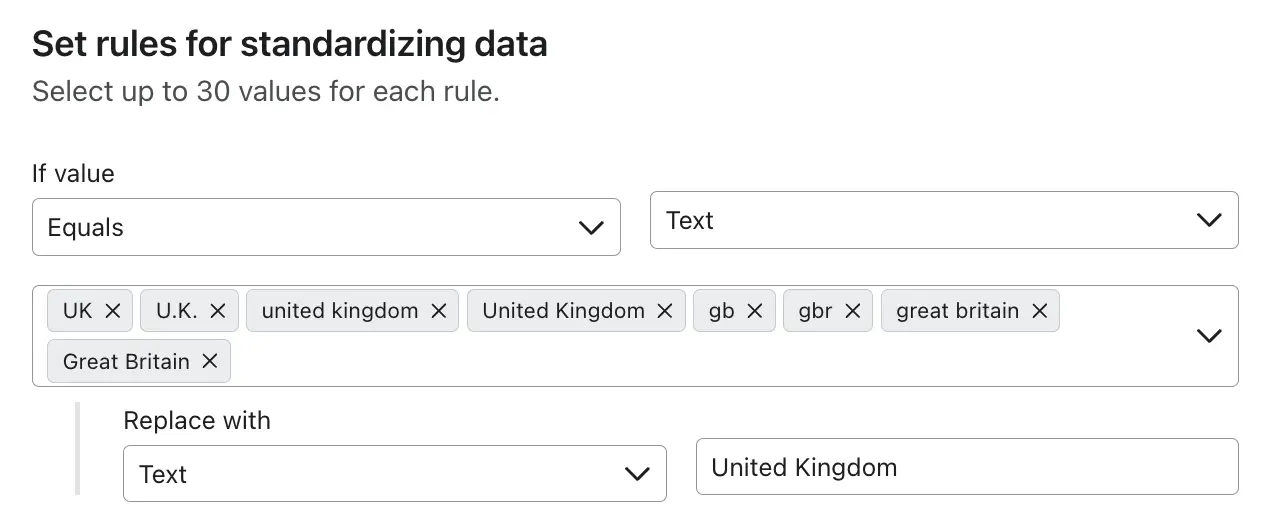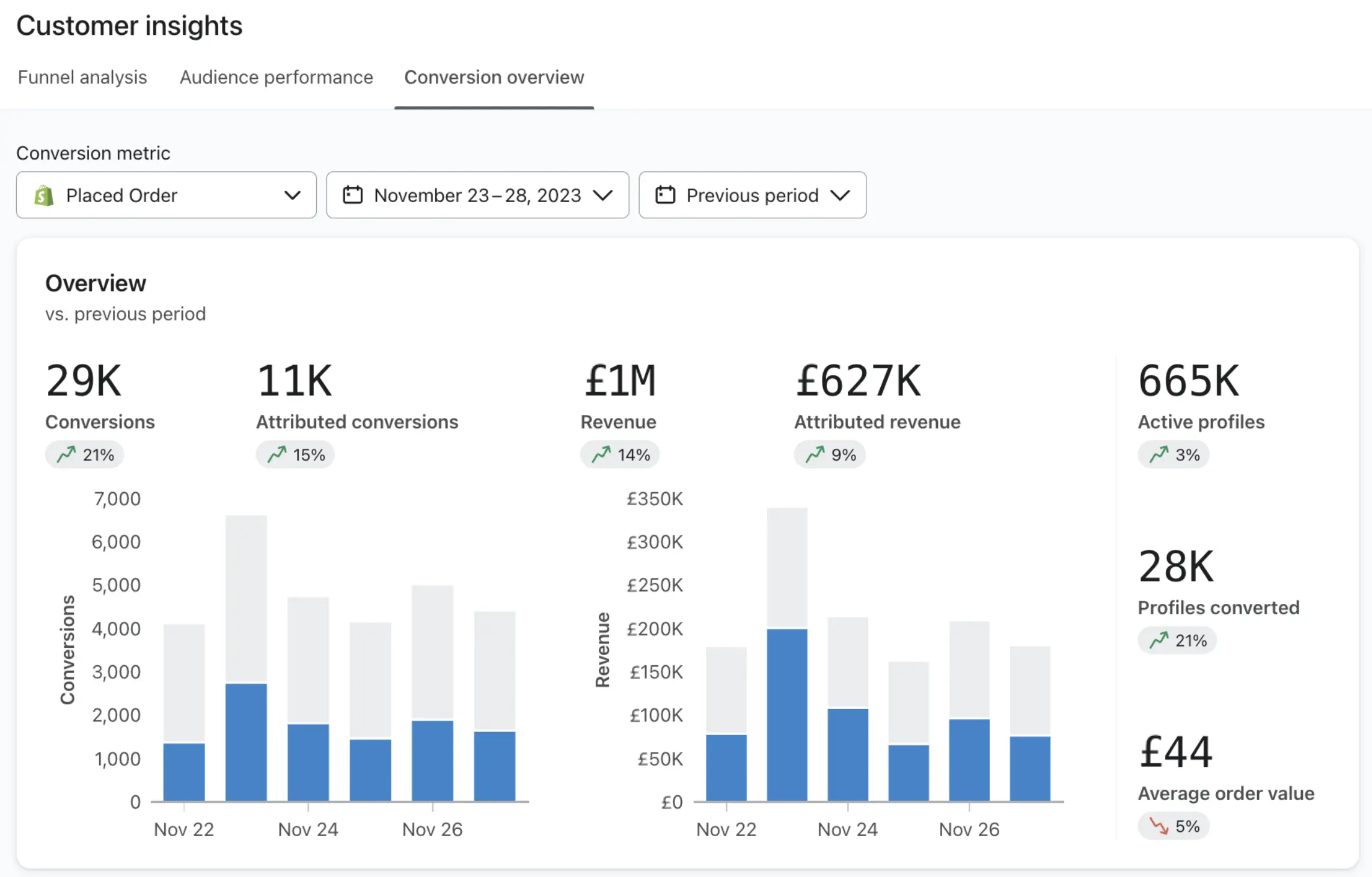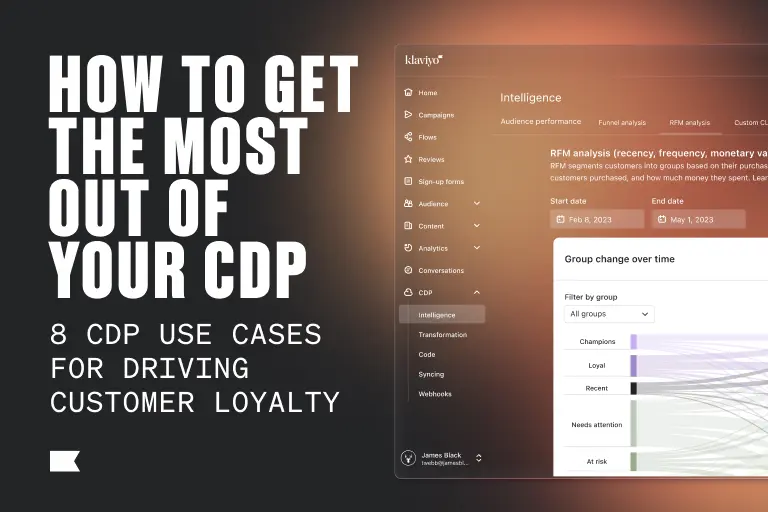15 ways you can use Klaviyo CDP to drive more Black Friday revenue
Today’s customers expect a personalised experience when interacting with a brand. In fact, 71% expect it every time, and 76% are frustrated when they don’t get it. As this holiday season kicks off, it’s critical to capture and retain customers through strategic, personalised digital experiences.
With Klaviyo’s customer data platform, you can supercharge your personalisation with rich insights on your customers and clean first-party data to leverage in marketing. Last year, brands using CDP drove an 11% increase in incremental revenue — smarter marketing at its finest.
Here are 15 ways to use Klaviyo CDP to create relevant, conversion-driving customer experiences.
Engage your audience and prep your content for BFCM
1. Drive up average order value by making it easy to order multiple items in a bundle
- Use the product analysis to determine the best bundles or sample packs to create based on products that customers commonly buy together.

2. Increase awareness with existing and potential customers through third-party ads
- Go beyond “VIPs” defined only by total spend and sync your RFM Champions segment to advertising channels to capture lookalikes of your best customers.
- Retarget a segment of RFM Needs Attention and At Risk customers who aren’t engaging with emails with a lead ad to collect phone number and SMS consent.
3. Don’t miss capturing your full audience when building segments and triggering flows
- Standardise or merge properties that you use in targeting, such as country and state names, to make sure that you capture everyone who qualifies.

4. Set up personalised website experiences for key segments like repeat buyers
- Set up group membership API, so site visitors will see more relevant products and messages – for example, show a product they haven’t purchased yet, or highlight that it’s time to replenish if they’ve purchased a consumable item.
5. Optimise your customers’ path to purchase by triggering messages at the right time
- Review a funnel analysis of the customer journey after they abandon a cart – and test your abandoned cart subject lines and CTAs to minimise drop-offs.
Bonus: Drive urgency onsite with a pop-up form and countdown timer targeted at site visitors with a cart value greater than $0 to drive urgency onsite!

Level up personalised messaging to maximise conversions
6. Implement a discount strategy that feels personalised for customers
- Add show/hide blocks to your BFCM templates to customise discounts based on RFM groups – whether you protect your margins by only showing discounts to customers who need the incentive, or personalise your Champion experience with a thoughtful discount code like “VIP-ONLY.”
7. Re-capture key customers with SMS if they haven’t purchased by mid-day
- Send a “Don’t Wait!” text reminder to RFM Champions who haven’t purchased yet.
- Send a “Last Call” text reminder with a special discount to RFM At Risk and RFM Needs Attention customers who clicked on a BFCM email but haven’t purchased yet.

8. Create a consistent customer experience with personalised website messaging
- Make sure the discounts you offer to different audiences are aligned to your website messaging – using group membership API for personalised webpages, banner forms, or flyouts on your website. Make sure you highlight that it’s for a limited time!
9. Increase cross-sell purchases and average order values by promoting complementary products
- Using insights from product analysis, set up targeted flyouts on specific product pages based on what customers often purchase together or in close succession.

10. Promote hyper-relevant products based on the weather in your recipient’s area
- Use a pre-built code function to add local weather forecast data to profiles, and personalise your outreach with a message that feels right for a rainy day.
Take a data-driven approach to plan and report on BFCM performance metrics
11. Get notified in-app or via email if your performance dips or anything breaks
- Set up a single metric monitor for Active on Site events to receive alerts if there’s a drop in traffic, so you can troubleshoot immediately.
- Set up a single metric monitor to proactively track the health of custom or third-party integrations, such as a spike in Gorgias support tickets submitted.

12. Connect with Slack or Microsoft Teams to announce when you hit key milestones
- Use a pre-built code function to get team-wide notifications about reaching revenue targets.

13. Identify key business priorities for BFCM and set targets based on past performance
- Track baselines by creating custom metrics beyond your typical placed order metric, such as revenue with a discount, non-recurring orders, in-store orders, or orders associated with a specific product category.
14. Share dashboards on BFCM performance across key metrics
- Generate a conversion overview dashboard highlighting your total and marketing attributed revenue and conversions for metrics like placed order, or your custom metrics.

15. Determine the right channels to use for future holiday messaging for top performing segments
- Review the audience performance report to understand if key segments generated more revenue from an email or an SMS, as well as which ones led to the most reviews or customer support tickets.



